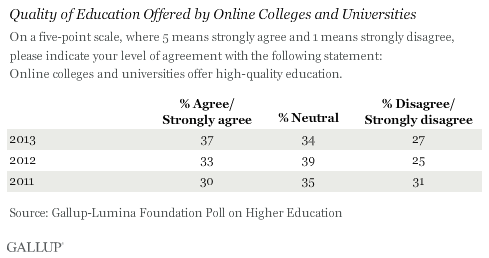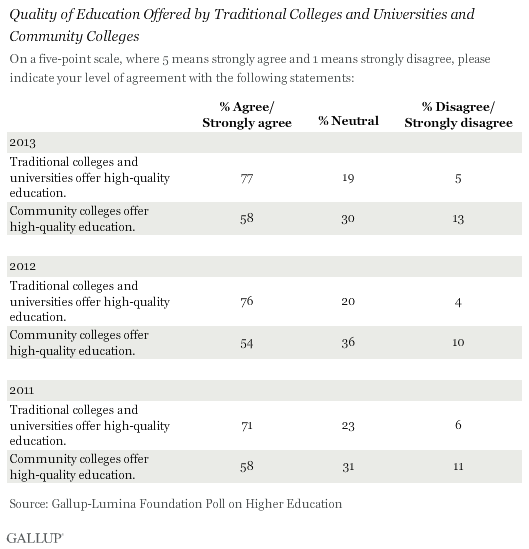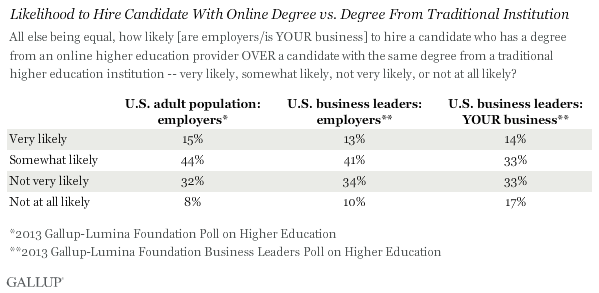This article is part of a weeklong series analyzing how education leaders, students, and teachers evaluate education in America. The series will feature Americans' opinions on topics such as the Common Core, a uniform set of academic skills and competencies in U.S. schools; the quality of public K-12 education; the level of respect for U.S. teachers; and the viability of online higher education.
WASHINGTON, D.C. -- Americans' trust in the quality of online colleges and universities is steadily rising. More U.S. adults, 37%, now agree or strongly agree that these institutions offer high-quality education than did so in 2011 (30%) when Gallup first asked this question. Roughly one in four (27%) disagree or strongly disagree.

These findings are from a Nov. 25-Dec. 15, 2013, study by Gallup and Lumina Foundation with a random sample of more than 1,000 U.S. adults. The research shows that while online higher education institutions have made progress on this measure, they still operate at a deficit compared with other traditional educational institutions. Far more Americans agree or strongly agree that community colleges (58%) and traditional colleges and universities (77%) offer high-quality education compared with online institutions.

Business Leaders Have Varying Perspectives on Hiring Online Graduates
Americans seem to have relatively more confidence in the graduates of online colleges and universities than in the quality of the institutions themselves. More than half of Americans (59%) say that, all else being equal, employers are at least somewhat likely to hire a candidate who has a degree from an online higher education provider over a candidate with the same degree from a traditional institution, though just 15% say they are very likely to select such a candidate.
In a separate 2013 Gallup-Lumina Foundation Business Leaders Poll on Higher Education, U.S. business leaders were asked the same question regarding the likelihood that employers would hire a candidate with a degree from an online higher education provider over a candidate with the same degree from a traditional institution. A similar proportion of business leaders polled (54%) say employers are at least somewhat likely to do so. However, a smaller percentage (47%) say they are at least somewhat likely to hire such a candidate for their own business.

Implications
Online colleges and universities continue to evolve, as do Americans' and business leaders' opinions about them. While perceptions about the quality of education at these institutions appear to be improving, attitudes toward community colleges and traditional universities remain far more positive at this point. And although more than half of business leaders and Americans in general say companies might be somewhat more likely to hire an online graduate over an equally qualified traditional college graduate, only about one in eight business leaders and one in seven U.S. adults overall say it is very likely. This represents room for improvement in the online education business.
Although online colleges and universities are still in their nascent stage, these findings seem to indicate an increasing acceptance of Internet-based education as a viable alternative to other more traditional institutions. As online colleges continue to grow and adapt to the needs of students and the marketplace, they have the potential to lower costs and increase accessibility to higher education, while imparting knowledge and skills that may be more relevant to today's high-tech employers. Online colleges, however, must continue closing the gap in regard to perceived quality if they aim to someday rival traditional colleges and universities.
Survey Methods
This article includes results from two surveys conducted by Gallup on behalf of Lumina Foundation.
Results from the first study reported are based on telephone interviews conducted as part of the Gallup-Lumina Foundation Poll on Higher Education Nov. 25-Dec. 15, 2013, with a random sample of 1,012 adults, aged 18 and older, living in all 50 U.S. states and the District of Columbia.
For results based on the total sample of 1,012 adults, one can say with 95% confidence that the margin of error attributable to sampling and other random effects is ±4 percentage points. For subgroups within this population (e.g., education level, gender, and income), the margin of error would be greater.
Interviews were conducted with respondents on landline telephones and cellular phones. Interviews were conducted in English only. Each sample of national adults included a minimum quota by region. Landline and cellular telephone numbers were selected using random-digit dialing. Landline respondents were chosen at random within each household on the basis of which member had the most recent birthday.
Samples were weighted to correct for unequal selection probability, nonresponse, and double coverage of landline and cell users in the two sampling frames. They were also weighted to match the national demographics of gender, age, race, Hispanic ethnicity, education, region, and phone status (cellphone only/landline only/both, and cellphone mostly). Demographic weighting targets were based on the most recent Current Population Survey figures for the aged 18 and older U.S. population. Phone status targets were based on the most recent National Health Interview Survey. All reported margins of sampling error include the computed design effects for weighting.
Results from the second study reported are based on telephone interviews conducted as part of the Gallup-Lumina Foundation Business Leaders Poll on Higher Education Nov. 25-Dec. 16, 2013, with a sample of 623 business leaders in executive and senior roles. The sample was obtained from Dun and Bradstreet and was stratified based on sales revenue. Businesses with larger sales revenue were oversampled to ensure enough completes for analysis. Interviews were conducted in English only.
For results based on the total sample of 623 business leaders, one can say with 95% confidence that the margin of error attributable to sampling and other random effects is ±6 percentage points.
Samples were weighted to correct for unequal selection probability and nonresponse by sales revenue and census region.
